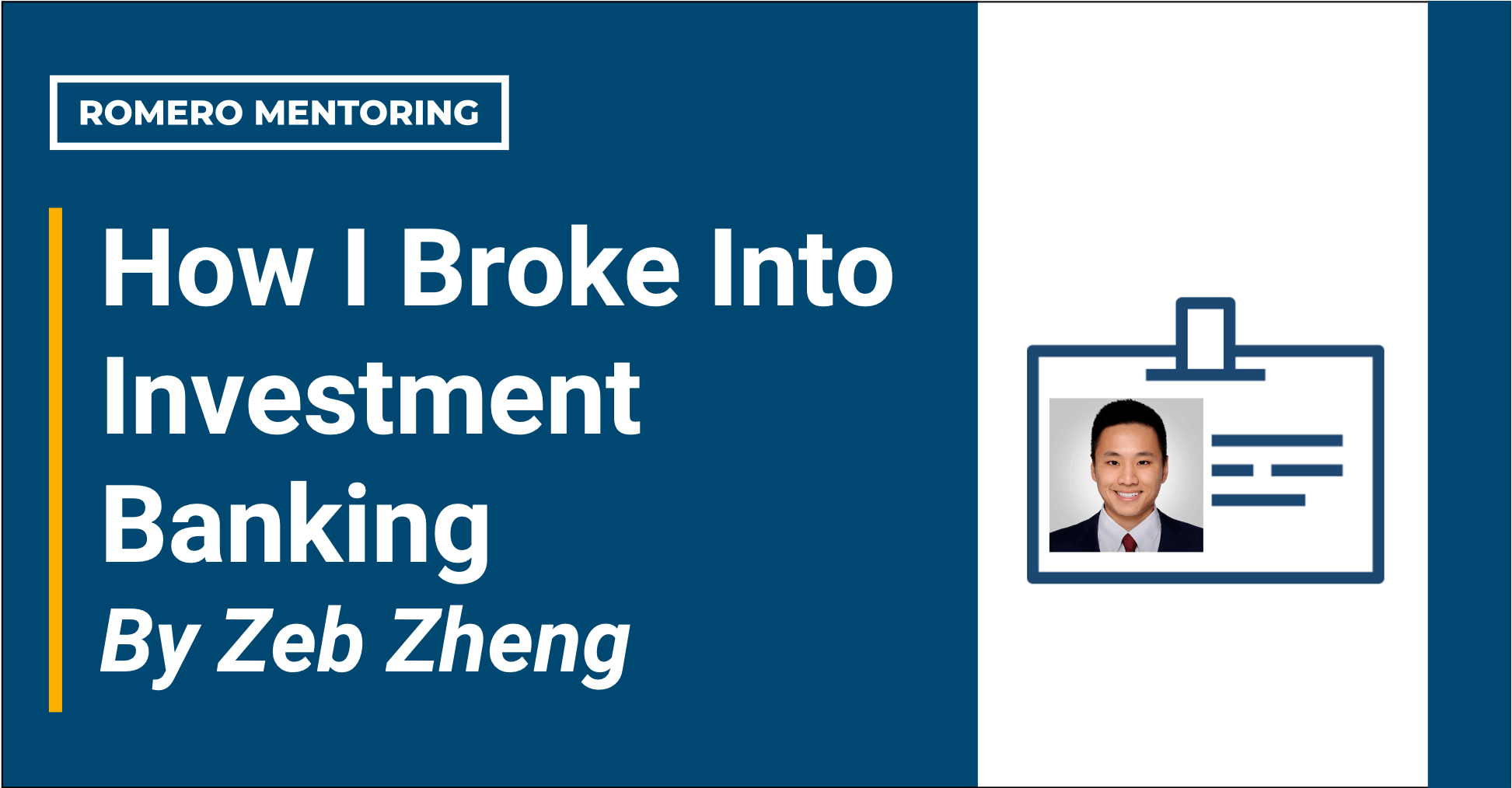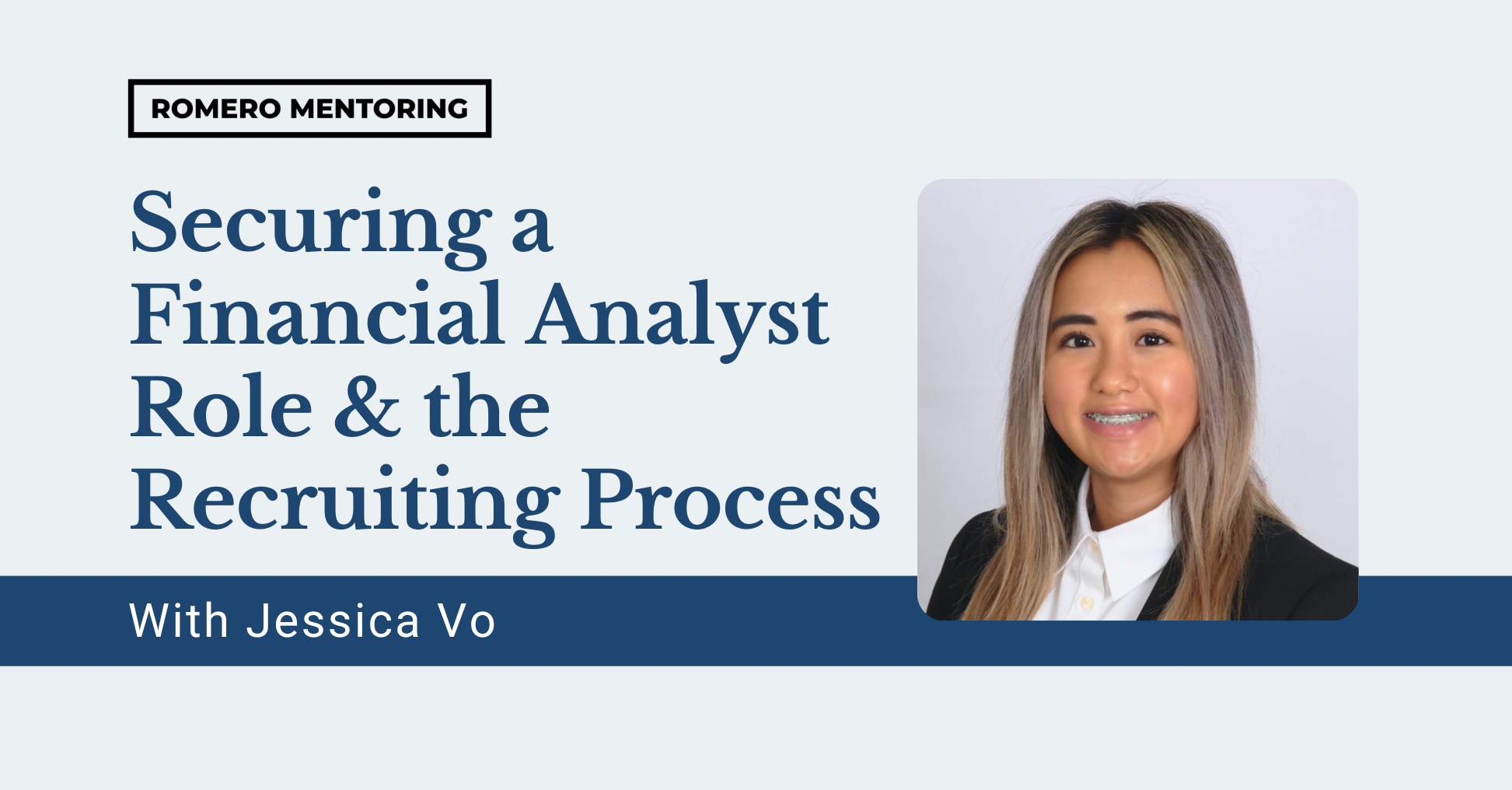My Background
My name is Zebadiah Zheng and I grew up in Houston, Texas. I am a senior at New York University and am currently majoring in economics with minors in business and political science. When I was deciding what college to attend, NYU was my top choice for two reasons. First, in terms of my career and future, the school offers a strong economics program along with the amazing professional opportunities of New York City. Second, and just as important to me, I was recruited for the school’s varsity tennis team. Reflecting on these past few years, NYU has been a perfect fit for me because I’ve been able to pursue my professional goals while also remaining committed to a sport that has shaped a very large part of my life.
Why Investment Banking Stood Out to Me
Throughout my life, I’ve always been curious about companies and the challenges that they face in a competitive marketplace. This curiosity was fueled by my father’s participation in a biotech startup when I was younger. While he preferred to talk about the research side of things, what really piqued my interest were the business-related discussions about how companies market their products, run their operations, and raise capital for their R&D. As a result, I initially investigated marketing and strategy during an internship after my freshman year at NYU. Despite having a good experience that summer, afterward I decided that I wanted to pursue a career that was a bit more fast-paced and competitive and where I could get a more holistic understanding of an entire company and its strategies.
With that in mind, I started looking into finance and investment banking. After conducting my own research and talking to several professionals in the industry, there were three aspects of the job that really stood out to me.
First, investment banking offers such an incredible learning experience. You get the chance to develop a unique set of both personal and professional skills that you can’t obtain anywhere else. In terms of the latter, this includes performing valuations and financial modeling and understanding how investors evaluate different businesses. For me, I couldn’t think of a more exciting opportunity than being able to learn these important skills so early on in my career.
Second, investment banking provides a fast-paced and goal-oriented environment where I can really push myself. While the job has very long hours and can be extremely challenging, I know that, as a student-athlete who is consistently in high-pressure situations, I have the right mindset and tools to be successful.
Finally, with those points in mind, my decision ultimately came down to the high caliber of the people in the industry. There’s a saying that “you’re the average of the five people you spend the most time with,” and I find that there’s a lot of truth in that. When I surround myself with high performers, I am inspired to improve and become the best version of myself. Consequently, I know that by being around the type of people who work in investment banking, I will be able to reach my full potential.
My Recruiting Experience
The summer before my junior year I landed an investment banking internship at a middle market firm. A few weeks before I was supposed to start, however, the program was cancelled due to COVID-19. Despite this setback, I was still determined to move forward with a career in investment banking, and so I enrolled in the Analyst Prep Program at Romero Mentoring. Through the program, I solidified my technical knowledge and also gained invaluable experience in modeling and analyzing real companies. In the fall I interviewed with around a dozen firms and ultimately landed three offers. Following my interest in healthcare, I accepted an offer from Cantor Fitzgerald in their healthcare group.
The Importance of Networking
In my opinion, a lot of students these days underestimate the importance of networking and focus too much on prepping for technicals. But sometimes networking is the only way that you’ll get an interview in the first place. Investment banking is highly competitive and often times there are hundreds or even thousands of applications for just one position. Many resumes look quite similar with candidates who have relevant internship experience, a good GPA, and participation in some type of finance club. As a result, simply submitting your resume to a random firm might not be enough to land a job.
One time I met up with an associate at UBS for coffee who told me that his company tended to select candidates to interview who had made a concentrated effort to speak with multiple members of the team. With so many potentially qualified candidates to pick from, the firm wanted to ensure that it was interviewing applicants who would get along with members of the team.
My biggest piece of advice is to start networking at least a month or two before applications open in the summer. You’ll need this extra time because it not only takes time to find the contact information of hundreds of bankers and to send out emails and make cold calls, but it also takes a while to set up coffee chats. Bankers have incredibly busy schedules so keep in mind that just because they don’t reply to your first e-mail it doesn’t necessarily mean that they are unwilling to connect. There were many times when I had to follow up with someone up to three times (I would refrain from following up more than three times) before I was able to schedule a time with them. Additionally, I recommend asking questions that show you have done your research on the firm, your genuine interest in investment banking, and that you have other interests outside of just finance.
How I Prepared for Interviews
In terms of technicals, if you have gone through the Romero Mentoring Analyst Prep Program, then you have already covered the majority of technical concepts that will be asked during interviews. Furthermore, the program gives you firsthand exposure to modeling, which is definitely an additional plus when it comes to interviews. However, I also suggest going through the questions in general guides like Breaking Into Wall Street and Wall Street Oasis. Personally, these gave me both an understanding of exactly how questions would be asked during interviews and examples of how I should structure my answers. Additionally, they occasionally touched on niche technical concepts that aren’t used too much in everyday modeling but are still asked about by some interviewers. Finally, the guides are useful because they provide commonly asked behavioral questions, brain teasers, and current event topics.
After studying my behaviorals and technicals, I did multiple mock interviews for further practice. This not only helped me work out any kinks I had in my delivery but also improved my confidence. No matter how much you study, if you aren’t able to confidently deliver your answers, then the interview will likely not go well.
In conclusion, from my experience, interviews really do not vary that much by firm (unless you’re interviewing for significantly different groups). Most firms will ask relatively similar behavioral and technical questions, so as long as you have gone through everything mentioned above, there is no need to be overly stressed.
General Tips and Advice on the Recruiting Process
There are a few general tips that I recommend students seeking to break into investment banking keep in mind. First of all, make sure to thoroughly research the firms that you’re applying to and interested in. It is important to understand that in the future you will spend the vast majority of your time at work. Consequently, you want to fit in well with the work culture of the firm and get along with your co-workers.
Additionally, I strongly suggest that you begin your preparation early. While recruiting is undoubtedly tough, the earlier you begin networking, the more interviews you will land. And the earlier you prepare for interviews, the better you will perform during them. While this might seem obvious, some peers of mine started networking months before the first applications even came out. These individuals were able to land offers before most people had even started interviewing. This is because their process was not only a bit less competitive but also less stressful as there were many upcoming opportunities available to them even if they didn’t initially do well. Finally, always keep your head up. Many people who break into investment banking don’t ace their first interview or land a job at the first bank where they interviewed. Recruiting isn’t an easy process and sometimes it takes multiple attempts.
About Romero Mentoring
Since 2016, Romero Mentoring investment banking training programs have been delivering career mentoring to job seekers, professionals, and college students pursuing careers in finance. We’ve helped hundreds of students start their careers on Wall Street through our Analyst Prep and Associate Investment Banking Training Programs. Our graduates work at top-bulge bracket banks and consulting firms, including Goldman Sachs, JP Morgan, McKinsey, and many more.





